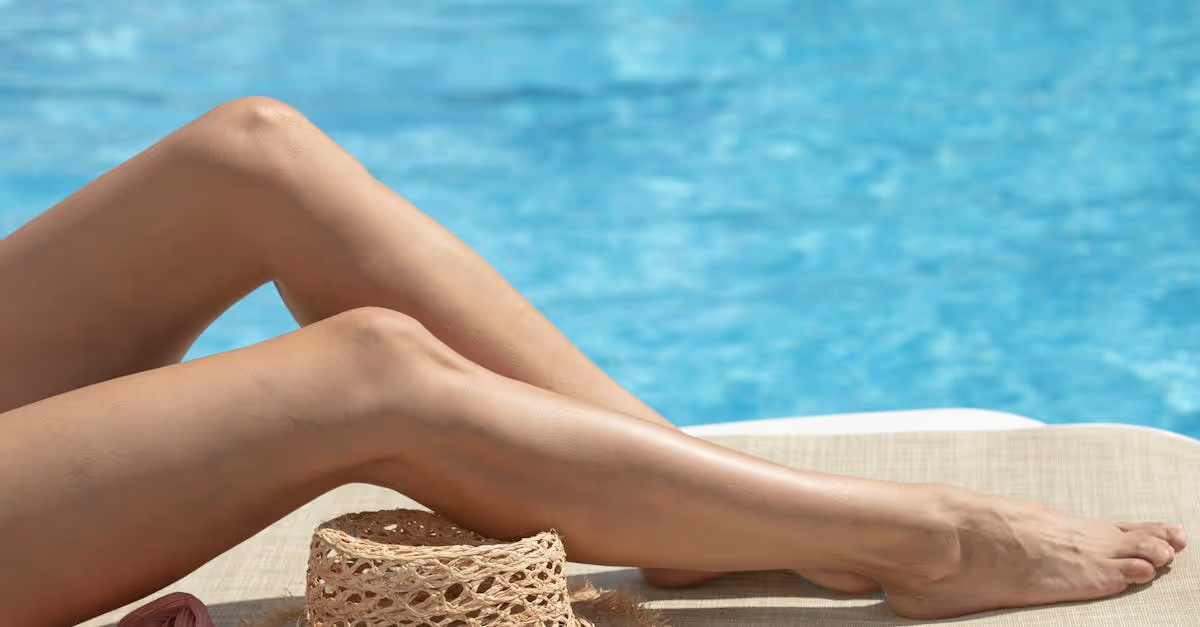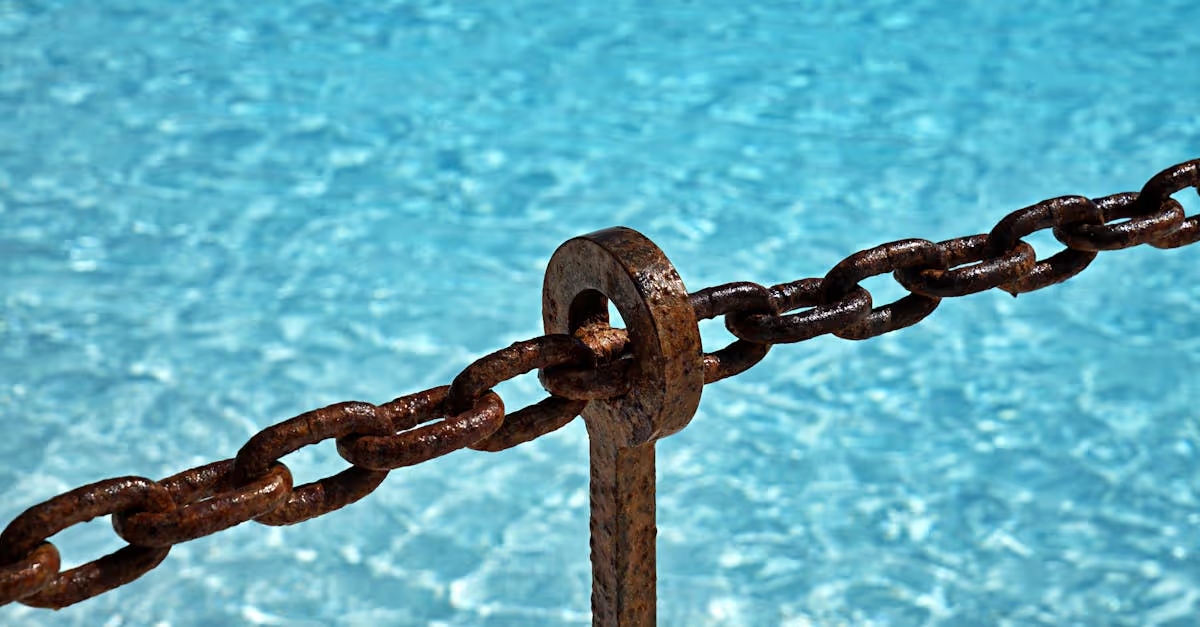Key Takeaways
- Understand Pool Heater Types: Familiarize yourself with the different types of pool heaters – gas heaters for quick heating, electric heat pumps for energy efficiency, and solar heaters for eco-friendly options.
- Maintain Ideal Temperature: Set your pool water temperature between 78°F and 82°F for optimal comfort, and adjust based on external conditions to enhance your swimming experience.
- Utilize Pool Covers: Use pool covers to reduce heat loss by up to 90% at night, trapping warmth and significantly improving energy efficiency.
- Optimize Heating Schedule: Employ timers to preheat your pool before use, ensuring a warm swim without the hassle of constantly checking the temperature.
- Prioritize Regular Maintenance: Schedule yearly inspections and clean your heater system regularly to ensure efficient performance and prevent costly breakdowns.
- Enjoy Extended Swimming Season: Extending your swimming season enhances enjoyment and relaxation, and increases your property's value, making it a worthwhile investment for both leisure and potential resale.
As the leaves change and temperatures drop, many of us start to think about closing up our pools for the season. But did you know that with the right pool heater, you can extend your swimming season by several months? Studies show that using a pool heater effectively can maintain water temperatures between 78°F and 82°F, making it comfortable even in cooler weather.
Understanding Pool Heaters
Pool heaters play a crucial role in extending our swimming season as the temperatures drop. With the right knowledge, we can maintain water temperatures between 78°F and 82°F, making our pools enjoyable even in cooler weather.
Types of Pool Heaters
We encounter three main types of pool heaters: gas heaters, electric heat pumps, and solar heaters.
- Gas Heaters: These provide quick heating, often reaching desired temperatures in under an hour. They operate on natural gas or propane, making them ideal for those who need immediate warmth.
- Electric Heat Pumps: Electric heat pumps extract heat from the air and transfer it to the pool. They are energy-efficient and best for moderate climates. However, they can struggle in very cold temperatures.
- Solar Heaters: These use energy from the sun to warm the water. While slower to heat, they are eco-friendly and free after installation. They work best during sunny days, so a backup method may be wise.
How Pool Heaters Work
Understanding how pool heaters work helps us maximize their efficiency. Gas heaters burn fuel to create heat, which is transferred to the pool water via a heat exchanger.
Electric heat pumps utilize a refrigerant to absorb ambient heat. The refrigerant circulates through a compressor, gaining energy and then releasing it into our pool.
Solar heaters operate by circulating pool water through pipes connected to solar panels. Sunlight warms the water before returning it to the pool.
Using heaters effectively requires thoughtful planning, such as covering the pool at night or during cloudy days to reduce heat loss.
By recognizing the strengths of each heater, we can choose the right option for our specific needs and enjoy those late-season swims together.
Tips for Using Pool Heaters Effectively
Using pool heaters smartly can help us enjoy our pools even when the temperature dips. Here are some key strategies for maximizing efficiency and extending our swimming season.
Setting the Right Temperature
Setting the water temperature correctly makes swimming comfortable. Aim for a range of 78°F to 82°F. This temperature feels pleasant, like a warm hug from your favorite sweater. If the water’s too warm, we might find ourselves sweating instead of enjoying a refreshing swim. Regularly check the heater settings, adjusting based on outside temperatures. For gas heaters, a few adjustments can yield significant results, while heat pumps thrive better in milder weather.
Using Pool Covers
Pool covers play a crucial role in heat maintenance. Covering the pool at night can prevent heat loss by up to 90%. A good cover acts like a blanket, trapping warmth and keeping the water at our desired temperature. Think about how cozy we feel under a blanket on a chilly night; our pool appreciates that warmth too. When choosing a cover, opt for a solid or insulated type. This choice increases efficiency and can save on energy bills.
Timing Your Heating Schedule
Timing our heating schedule is key. Utilize timers to start heating the pool just before we plan to swim. For instance, if we want to take a dip in the evening, setting the heater a few hours prior can mean the difference between a frosty swim and a delightfully warm experience. Employing timers or smart technology simplifies this process, allowing us to enjoy the warm water without constantly checking the temperature. Plus, who wouldn't want to avoid the dreaded chilly splash?
Maintenance for Optimal Performance
Regular maintenance keeps our pool heaters running efficiently during colder months. We can avoid potential breakdowns and extend our swimming season with some proactive steps.
Regular Inspections
Regular inspections play a key role in maintaining heater performance. Scheduling a professional service once a year offers peace of mind. Technicians can identify any developing issues before they become major problems. They check for leaks, assess the thermostat accuracy, and inspect all connections. Kicking back in our warm pool beats troubleshooting heater malfunctions mid-swim. Plus, knowing our heater's in top shape just feels good.
Cleaning the Heater System
Cleaning the heater system enhances its performance and longevity. Dirt and debris can build up, causing our heater to work harder and use more energy. We can start by clearing away any leaves or debris around the unit. Next, inspecting and cleaning filters allows for better airflow. Keeping the heater shell clean prevents corrosion. If we notice any strange noises, it’s time to consult a technician. With regular cleaning, our heater provides consistent heat, letting us swim comfortably even during chilly evenings.
Taking these steps helps us enjoy our pools to the fullest while maintaining optimal heater performance during the colder months.
Benefits of Extending the Swimming Season
Extending the swimming season brings numerous advantages that enhance our pool experience, especially as temperatures fall. Enjoying our pools longer not only keeps the fun going but also adds value to our leisure time.
Improved Enjoyment and Relaxation
We can greatly increase our enjoyment and relaxation by using pool heaters. Maintaining warm water allows us to swim even when it's chilly outside. Picture this: a frosty evening, you and your friends dive into a warm pool, laughing and splashing away the cold. Keeping the water around 78°F to 82°F transforms chilly nights into cozy gatherings. It’s much more inviting than huddling indoors, right? Plus, with the right heater, we can enjoy lazy weekends by the pool long after summer ends. Who wouldn’t want to extend that joy?
Increased Property Value
Extending our swimming season can also boost our property's value. Homes with functional, year-round pools often attract buyers. A heated pool shows potential buyers that they can enjoy outdoor activities regardless of the season. We can picture families enjoying summer fun together, creating memories for years to come. Use of a pool heater adds that appealing touch, making our property stand out. It's like having that extra cookie in the jar—everyone wants it! Investing in a proper heater is smart for enjoyment now and a great selling point later. Who knows? Our neighbors might come calling, asking us how we do it.
Conclusion
By effectively using pool heaters during the colder months we can significantly extend our swimming season. With the right heater and some thoughtful strategies we can maintain comfortable water temperatures and enjoy our pools longer. Regular maintenance and smart heating practices not only enhance our experience but also contribute to energy efficiency.
Investing in a quality heater and utilizing covers can make a world of difference in keeping our pools warm and inviting. As we embrace the joys of swimming in cooler weather we also create cherished memories and increase our property's value. Let’s make the most of our pool investments and savor every moment in the water, even as the temperatures drop.
Frequently Asked Questions
What are the benefits of using a pool heater?
Using a pool heater allows you to extend your swimming season, enabling comfortable swimming in cooler weather. By maintaining water temperatures between 78°F and 82°F, you can enjoy your pool for longer periods, hosting cozy gatherings and creating lasting memories.
What types of pool heaters are available?
There are three main types of pool heaters: gas heaters, which heat quickly using natural gas or propane; electric heat pumps, which are energy-efficient but less effective in very cold temperatures; and solar heaters, which are eco-friendly but take longer to heat water.
How can I maximize the efficiency of my pool heater?
To maximize efficiency, cover your pool at night to reduce heat loss, check temperature settings regularly, and use timers to heat the pool before swimming. This prevents unnecessary energy consumption and ensures your pool is warm when you're ready to swim.
How do I maintain my pool heater for optimal performance?
Regular maintenance is key for your pool heater. Schedule annual professional inspections, clean debris, inspect filters, and maintain the heater shell. This ensures efficient operation, prolongs the lifespan of the heater, and identifies potential issues early.
Can a pool heater increase my property's value?
Yes, a pool heater can increase your property's value by making it more attractive to potential buyers. A heated pool allows for extended enjoyment and can be viewed as a desirable feature in a home, enhancing the overall appeal of your property.






